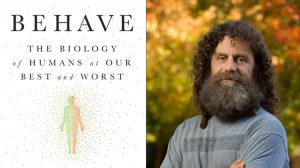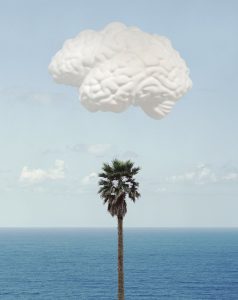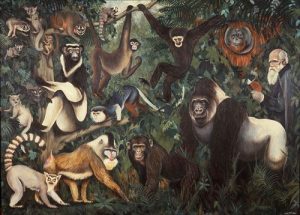BY BAR YOSEF| SQ ONLINE WRITER | SQ ONLINE (2016-17)
____________________________________________________________________________
Are humans just a bunch of neurons? Are we just another primate? These questions guide the research of Dr. Robert Sapolsky. A professor of biology, neurology, and neurosurgery at Stanford, Sapolsky splits his time between being a laboratory neurobiologist and a primatologist in a park in East Africa. He recently published a book called Behave: The Biology of Humans at Our Best and Worst. He analyzes behavior on multiple levels, coming to the conclusion that humans have no free will.

First, he analyzes a variety of behaviors from the neurobiological perspective. He analyzes the brain seconds before the behavior happened. He characterizes the sensory world a little earlier in time and the hormones hours and days before. He describes structural changes in the nervous system over months leading up to the behavior and the individual’s adolescence, childhood, fetal life, and genetic makeup. Then, he moves beyond the individual to analyze the cultural, ecological, and evolutionary factors influencing the behavior.
Sapolsky believes that behavior can’t be analyzed without considering biology at every step of the way, but that biology can’t be used on its own. Behavior must be contextualized in the individual psyche and society. He also believes that we can’t depend on one type of biology. Currently, genetics is the “bandwagon-ish realm of biology,” enabled by the genomics revolution. Sapolsky discards the notion that “stuff is determined by your genes.” He views this as a reductionist notion in Western science, that you need to look at the small parts in an attempt to understand the whole. While this has enabled many discoveries in science, like the polio vaccine, it falls short in neuroscience. He describes this as equating the brain with a clock: if it isn’t working, you find the small parts that are broken. However, the brain is much more like clouds than like clocks running on simple gears.

He also subverts the dichotomy of the nature versus nurture argument. Sapolsky says that there is no gene that does something, only genes that do certain things in specific environments. He says, “The problem with ‘a gene-environment interaction’ is the same as asking what height has to do with the area of a rectangle, and being told that in this particular case, there is a height/length interaction.” In reality, the area of a rectangle is always determined by the length and height, and a trait is always the result of genes and the environment.
Sapolsky also challenges other longheld Western notions. According to him, Descartes was wrong, the brain does not handle cognition and emotion differently. In reality, emotion and rationality are intertwined. One demonstration of this is the ultimatum game. One player is given a sum of money and decides how to split it with the second player, who can decide whether or not to accept the offer. The second player tends to reject the offer if it is worse than a sixty, forty split even though they then gain nothing if they reject it. This reveals humans’ economic irrationality.
So, let’s go back to Sapolsky’s questions. Are we just another primate? The answer is probably yes, and no. Humans are not the only species that commit murder, rape, or war. We are also not the only species to display empathy or have a sense of justice. However, we are the only species that can commit violence in such a disconnected way as pulling and trigger and the only species shown to display empathy for people we’ve never met, fictional characters, and other species. While we display aggression like other primates, we also uniquely display passive aggressiveness. So, we are like other apes more so than we like to think, but have many traits that go beyond those of primates.

Are we just a bunch of neurons? Certain discoveries suggest so. For example, there is a neurotransmitter called vasopressin that is associated with male sexuality. There are two variations of vasopressin known as receptor 1 and receptor 2. In rodents and humans, it has been shown that those with receptor 1 are monogamous and those with receptor 2 tend to be more polygamous. While some characteristics are very directly influenced by the brain, we are probably not just a bunch of neurons, but a bunch of neurons influenced by their individual psyche, societal context, evolutionary history, and ecological surroundings.
For this reason, Sapolsky believes that humans have no free will. He discusses in his book how the idea of free will relates to political ideology. There has been shown to be a positive correlation between disgust sensitivity and social conservatism. Furthermore, when people are in a room with smelly garbage, their stance on social issues becomes more conservative. Even your political ideologies, which you may feel you choose to subscribe to, are as innate as how bothered by a messy room you are and so variable as to depend on the smell of the room you’re in.
On May 4th, Sapolsky discussed free will, as well as how his book relates to race in America, whether or not Donald Trump can be considered a nice person (he jokingly answers no), and the criminal justice system (which he thinks should be completely reformed) on the Daily Show with Trevor Noah.
Everything about you and every decision you’ve ever made may be completely out of your control. This notion is troubling to accept, even for Sapolsky. What does this mean for us as individuals, and as a society? Is there even a point in determining whether or not we have free will? Either way, we may have no choice but to continue to.
Sources:
- Behave: The Biology of Humans at Our Best and Worst
- http://news.stanford.edu/2017/05/08/biologist-robert-sapolsky-takes-human-behavior-free-will/
- https://www.edge.org/response-detail/23799
- https://www.edge.org/response-detail/25536
- Being Human Episode 1: “What’s So Special about Being Human?”